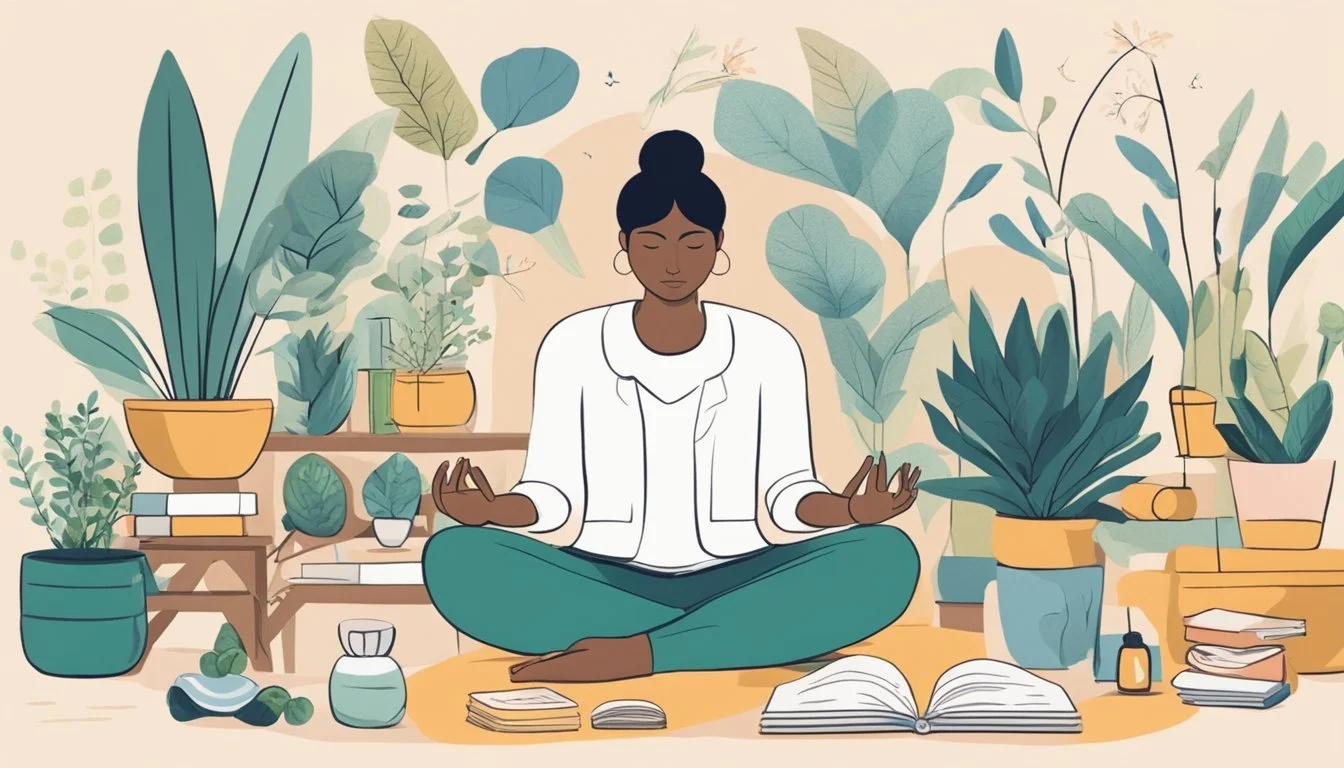8 Tips for Empaths to Maintain Their Identity in Relationships
Balancing Self and Partnership
Empaths possess a unique ability to deeply sense and absorb the emotions of others. This heightened sensitivity can be both a blessing and a challenge, especially in romantic relationships. Empaths often find themselves navigating a delicate balance between their natural inclination to nurture their partners and the need to maintain their own identities.
Understanding how to preserve one's sense of self while fostering a loving connection is crucial for empaths in relationships. This article explores practical strategies for empaths to protect their emotional well-being and cultivate healthy boundaries with their partners. By implementing these tips, empaths can create fulfilling relationships without compromising their essential nature or becoming overwhelmed by their partner's emotional states.
1) Set Boundaries Early
Empaths often struggle to maintain their identity in relationships due to their heightened sensitivity to others' emotions. Setting boundaries early is crucial for preserving their sense of self and emotional well-being.
By establishing clear limits from the start, empaths can prevent emotional overwhelm and maintain healthy relationships. This involves communicating personal needs, preferences, and limitations to partners and friends.
Empaths should express their need for alone time, quiet spaces, or limited social interactions without guilt. They can also set boundaries around physical touch, energy-draining conversations, or excessive problem-solving for others.
It's important for empaths to practice saying "no" to requests that don't align with their values or energy levels. This helps prevent resentment and burnout in relationships.
Setting boundaries early allows empaths to create a framework for mutual respect and understanding within their relationships. It enables them to maintain their identity while still fostering meaningful connections with others.
2) Communicate Openly
Empaths often sense their partner's emotions intuitively, but this doesn't replace clear verbal communication. Open dialogue is crucial for maintaining a healthy relationship and individual identity.
Empaths should express their needs, boundaries, and feelings directly to their partners. This helps prevent misunderstandings and ensures both parties are on the same page.
It's important for empaths to share when they need alone time or feel overwhelmed by absorbing others' emotions. Partners can better support empaths when they understand these unique sensitivities.
Empaths should also encourage their partners to communicate openly in return. This creates a balanced exchange and prevents the empath from relying solely on their intuitive perceptions.
Regular check-ins can be helpful for empaths and their partners. These conversations allow both individuals to discuss any concerns, celebrate successes, and adjust their approach as needed.
By fostering open communication, empaths can maintain their sense of self while building strong, authentic connections with their partners. This practice supports both individual growth and relationship harmony.
3) Practice Self-Care
Self-care is crucial for empaths to maintain their identity in relationships. Empaths often absorb others' emotions, making it essential to recharge and nurture themselves.
Regular alone time allows empaths to process their feelings and restore energy levels. This can involve activities like meditation, journaling, or simply relaxing in nature.
Setting boundaries is another important aspect of self-care for empaths. Learning to say no to excessive demands helps prevent emotional burnout and maintains personal well-being.
Engaging in physical activities like yoga, walking, or swimming can help empaths release absorbed emotions and reduce stress. These practices promote body awareness and grounding.
Empaths benefit from creating a peaceful home environment. Decluttering, using calming colors, and incorporating soothing scents can provide a sanctuary for emotional recharging.
Prioritizing sleep and proper nutrition supports an empath's overall well-being. A well-rested and nourished body is better equipped to handle emotional challenges.
Seeking support from understanding friends or professionals can provide empaths with valuable perspectives and coping strategies. This support network helps maintain emotional balance.
4) Engage in Hobbies
Empaths can maintain their identity in relationships by dedicating time to personal hobbies. Engaging in activities they enjoy allows them to recharge and reconnect with themselves.
Hobbies provide a space for self-expression and creativity, helping empaths stay grounded in their own interests and passions. This can include learning a new language, practicing art, or exploring nature.
Physical activities like yoga, hiking, or dancing can be particularly beneficial. These hobbies help empaths release absorbed emotions and restore their energy levels.
Quiet, solitary pursuits such as reading, journaling, or meditation offer empaths opportunities for introspection and emotional processing. These activities can help them maintain emotional balance and clarity.
Empaths may find fulfillment in nurturing hobbies like gardening or caring for pets. These activities allow them to channel their compassionate nature in a controlled environment.
By prioritizing time for hobbies, empaths create healthy boundaries in their relationships. This practice reinforces their sense of self and prevents them from becoming overly enmeshed with their partner's emotions.
5) Utilize Emotional Shields
Empaths often absorb the emotions of others, which can be overwhelming in relationships. Emotional shields serve as protective barriers, allowing empaths to maintain their identity and well-being.
One effective shielding technique is visualization. Empaths can imagine a protective bubble or shield surrounding them, blocking negative energy while allowing positive energy to flow through.
Crystals like black tourmaline can act as physical shields. Wearing or carrying these stones may help empaths feel more grounded and protected from external emotional influences.
Practicing mindfulness and meditation strengthens an empath's ability to create mental boundaries. These techniques help empaths stay present and centered, reducing the impact of others' emotions.
Setting clear boundaries in relationships is crucial. Empaths should communicate their needs and limits to their partners, establishing a healthy emotional space for both individuals.
Regular self-care routines, such as spending time in nature or engaging in relaxing activities, help empaths recharge and maintain their emotional shields. This practice ensures they have the energy to navigate their relationships effectively.
6) Develop Assertiveness
Empaths often struggle with assertiveness, fearing they might hurt others' feelings. However, developing this skill is crucial for maintaining their identity in relationships.
Assertiveness involves expressing one's needs, wants, and boundaries clearly and respectfully. It's not about being aggressive or selfish, but rather about communicating effectively.
Empaths can start by practicing saying "no" when they feel overwhelmed. This helps prevent resentment and burnout in relationships.
Learning to express emotions and opinions without apologizing is another important step. Empaths should remember that their feelings are valid and deserve to be heard.
Using "I" statements can be helpful. For example, saying "I feel overwhelmed when..." instead of "You always make me feel..."
Setting clear boundaries is a key aspect of assertiveness. Empaths should identify their limits and communicate them to their partners and friends.
It's also important for empaths to recognize that being assertive doesn't mean they're being unkind. They can still be compassionate while advocating for their own needs.
With practice, empaths can become more comfortable with assertiveness, leading to healthier and more balanced relationships.
7) Create Personal Space
Empaths often need more alone time than others to recharge and process their emotions. Setting aside dedicated personal space is crucial for maintaining a sense of self in relationships.
This space can be a physical area in the home, like a spare room or cozy corner, where the empath can retreat when feeling overwhelmed. It should be a sanctuary free from external stimuli and partner interactions.
Establishing regular periods of solitude is equally important. This might involve taking solo walks, practicing meditation, or engaging in a personal hobby without interruption. These moments allow empaths to reconnect with their own thoughts and feelings.
Partners should respect these boundaries and understand that an empath's need for space is not a rejection, but a necessary form of self-care. Clear communication about these needs can prevent misunderstandings and strengthen the relationship.
By prioritizing personal space, empaths can better manage their energy levels and emotional well-being. This, in turn, allows them to be more present and engaged when spending time with their partner.
8) Limit Overexposure
Empaths often absorb the emotions and energy of those around them. To maintain their identity in relationships, it's crucial for empaths to limit overexposure to intense emotional situations or large crowds.
Setting boundaries on social interactions can help empaths recharge and maintain their emotional balance. This may involve declining invitations to crowded events or limiting the duration of social engagements.
Empaths can create designated quiet times or spaces in their homes where they can retreat and decompress. These personal sanctuaries allow for emotional processing and self-reflection without external influences.
It's beneficial for empaths to schedule regular alone time to reconnect with their own thoughts and feelings. This practice helps them distinguish between their emotions and those they've absorbed from others.
Empaths may find it helpful to engage in activities that ground them and clear their energy. Practices like meditation, nature walks, or creative pursuits can serve as effective tools for emotional reset.
By limiting overexposure, empaths can better preserve their sense of self and maintain healthier relationships with others.
Understanding Your Empathic Nature
Empaths possess a unique ability to sense and absorb the emotions of others. This trait shapes their interactions and relationships in profound ways.
Recognizing Empathic Traits
Empaths often experience intense emotional reactions to their surroundings. They may feel overwhelmed in crowded places or during conflicts. Many empaths report physical sensations linked to others' emotions, such as tension headaches or fatigue.
Heightened intuition is another common trait. Empaths frequently pick up on subtle cues and unspoken feelings. This can lead to deep, meaningful connections but also emotional exhaustion if not managed properly.
Empaths tend to be excellent listeners and natural healers. They often find themselves in roles where they provide emotional support to others. This can be rewarding but may also drain their energy if boundaries are not established.
Distinguishing Empathy from Sensitivity
While empathy and sensitivity are related, they are distinct traits. Empathy involves understanding and sharing the feelings of others. Sensitivity refers to a heightened awareness of one's environment and emotions.
Empaths not only sense emotions but also absorb them. This can lead to difficulty separating their own feelings from those of others. Sensitive individuals may be more reactive to stimuli but don't necessarily take on others' emotional states.
Empaths often need more time to process emotional experiences. They may require solitude to recharge after social interactions. Sensitive people might also need quiet time, but typically for different reasons, such as sensory overload.
Navigating Emotional Boundaries
Empaths can maintain their identity in relationships by establishing clear emotional boundaries. This involves setting limits and communicating needs effectively.
Setting Healthy Boundaries
Empaths often absorb others' emotions, making it crucial to establish personal space. Create a "bubble" of emotional protection by limiting exposure to draining situations or people.
Take regular breaks from social interactions to recharge. This could mean stepping outside for fresh air or finding a quiet spot to meditate.
Learn to say "no" without guilt. Prioritize self-care activities that replenish energy, such as reading, nature walks, or creative pursuits.
Practice mindfulness to distinguish between personal emotions and those of others. This awareness helps empaths respond thoughtfully rather than reactively.
Communicating Needs Effectively
Express needs and limits clearly to partners, friends, and family. Use "I" statements to convey feelings without blame, such as "I need some alone time to recharge."
Be specific about requirements for emotional well-being. For example, "I'd appreciate 30 minutes of quiet time after work to decompress."
Listen actively to others' perspectives, but maintain firm boundaries. Acknowledge their feelings while standing ground on personal needs.
Seek compromise when possible, but don't sacrifice essential self-care. Negotiate win-win solutions that respect both parties' emotional needs.
Maintaining Personal Identity
Empaths can preserve their sense of self while nurturing relationships. This involves balancing personal needs with those of partners and developing strong self-awareness.
Balancing Relationships and Self-Care
Empaths need dedicated time for self-care to recharge. Schedule regular alone time for activities that restore energy, like meditation or nature walks.
Set clear boundaries with partners about personal space needs. Communicate openly about requiring solitude to process emotions and recharge.
Maintain separate interests and friendships outside the relationship. Pursue individual hobbies and goals to retain a sense of autonomy.
Cultivating Self-Awareness
Practice mindfulness to stay attuned to personal emotions and needs. Check in regularly with inner feelings to distinguish them from absorbed emotions.
Keep a journal to track thoughts and patterns. Reflect on which traits and values feel authentic versus absorbed from others.
Engage in activities that foster self-discovery, like personality assessments or therapy. Gain clarity on core values, strengths, and areas for growth.
Regularly reassess and adjust boundaries as needed. Be willing to communicate changes to partners to ensure continued alignment with personal needs.









